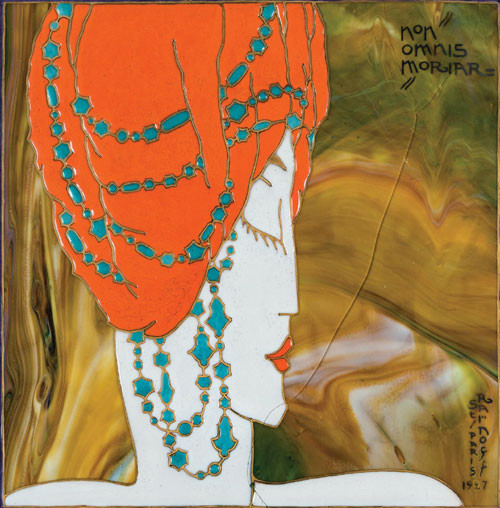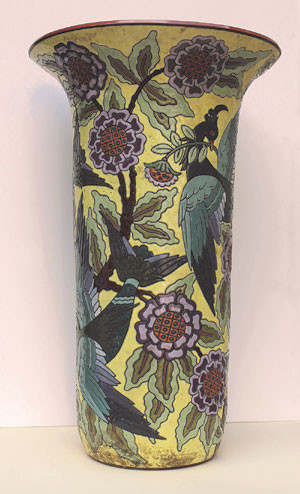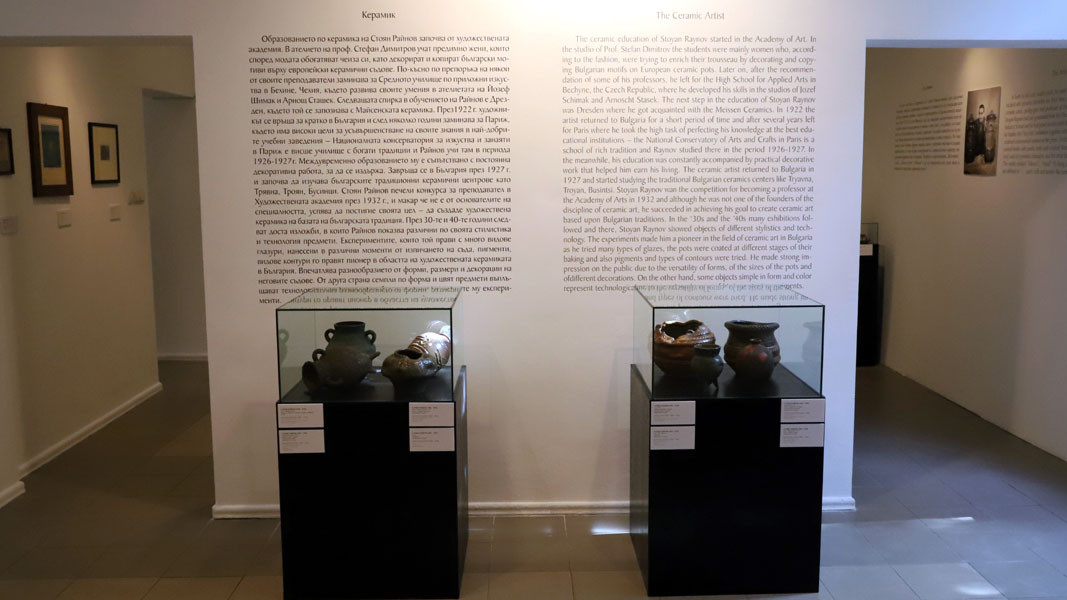Not Everything Dies is the name of a work chosen as the logo of a collective exhibition dedicated to the legacy of one of the most productive and talented Bulgarian ceramists Stoyan Raynov. The exhibition arranged at Vaska Emanuilova Gallery in Sofia includes ceramic works from his early period as an illustrator as well as pieces he created as an established ceramist. The accent falls on 23 works which are part of the museum collection of the National Academy of Arts. According to the curator of the Sofia City Art Gallery Neda Zhivkova, the exhibition is important, because it presents Stoyan Raynov both as an artist and a reputable professor at the National Academy of Arts.
 Before choosing ceramics, Raynov was an illustrator, painter and graphic artist, which is seen in his work titled Not Everything Dies. The plot itself is a stylized profile of a woman in a manner typical of the East. It is based on a mosaic ceramic technique, which is a rarity in Bulgarian art. Stoyan Raynov even put his signature vertically which reminds of the style of the modernists in that period. This is not surprising, because the artist studied in some of the best ceramic workshops in European capitals, Neda Zhivkova says.
Before choosing ceramics, Raynov was an illustrator, painter and graphic artist, which is seen in his work titled Not Everything Dies. The plot itself is a stylized profile of a woman in a manner typical of the East. It is based on a mosaic ceramic technique, which is a rarity in Bulgarian art. Stoyan Raynov even put his signature vertically which reminds of the style of the modernists in that period. This is not surprising, because the artist studied in some of the best ceramic workshops in European capitals, Neda Zhivkova says.
The periodicals in the 1920’s wrote that mainly women who were making wedding dowry were engaged in hand-made ceramics. Thus, ceramics was perceived as a hobby and a type of craft.  Stoyan Raynov is among the founding fathers of contemporary Bulgarian ceramics He specialized abroad and later returned to Bulgaria and lectured at the National Academy of Arts. In 1932 he introduced many new techniques, modern multi-color embellishment applied beneath the vases and other tableware. He also introduced other techniques that were unknown in Bulgaria earlier. Raynov brought technological novelties as well. One of his vases is in the art nouveau style. It depicts chestnut leaves and birds. The shapes of the objects are topical even at present.
Stoyan Raynov is among the founding fathers of contemporary Bulgarian ceramics He specialized abroad and later returned to Bulgaria and lectured at the National Academy of Arts. In 1932 he introduced many new techniques, modern multi-color embellishment applied beneath the vases and other tableware. He also introduced other techniques that were unknown in Bulgaria earlier. Raynov brought technological novelties as well. One of his vases is in the art nouveau style. It depicts chestnut leaves and birds. The shapes of the objects are topical even at present.
When Stoyan Raynov returned from the European schools, he started to study in details the Bulgarian ceramics and managed to combine the experience he gained abroad with the Bulgarian national style and the results were impressive. Even in ordinary ceramic sets experts find successful experiments with coating and enamel where ceramics was baked at different temperatures. Thus, Raynov achieved interesting effects, light and shadow, which seem to be random, but were actually thought over well.

More from Neda Zhivkova: Stoyan Raynov was outshined by his popular brother Nikolay Raynov, a reputable figure in art and literature. The painter is part of a very interesting artistic circle which linked the great personalities of that time such as Geo Milev, Dimcho Debelyanov, Nikolay Liliev, Sirak Skitnik, etc. Two of Raynov’s remarkable works presented at the exhibition are vases containing excerpts from literary works. The quotations were taken from Nikolay Raynov’s book Bogomil Legends which was very topical in the 1930’s. After 1944 creative work changed significantly. The Secession style motifs disappeared and the images and the plots changed as well. Stoyan Raynov focused mainly on his job as a lecturer but did not stop experimenting and being an innovator in the field of ceramic art.
English version: Kostadin Atanasov
Photos: Vaska Emanuilova Gallery"Thank you to Petar Angelov, Michaela Velichkova, Sonia Chakarova and all the members of the representative folklore ensemble Shevitsa for the wonderful performance they gave to the people of Tsaribrod on the occasion of the upcoming holidays," wrote..
The Natalia Simeonova Foundation has filed documents for registration of a community center that will be named after the legend of Bulgarian rock music Kiril Marichkov . This was announced to the Bulgarian National Radio by the former host of one of the..
The sculpture “Sand Nativity in Burgas”, which artists Paul and Remy Hoggard are sculpting in the center of Burgas in front of the people of the city, will be ready for Christmas Eve and will remain there until January 7, 2025. The..

+359 2 9336 661
